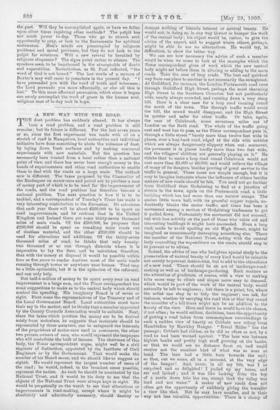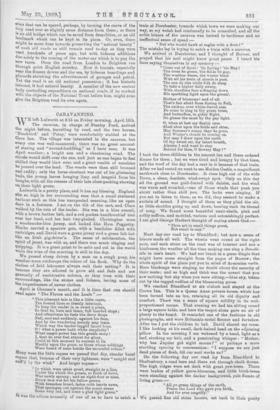A NEW WAY WITH THE ROAD.
TIM dust problem has suddenly altered. It has always been a road problem, and a road problem it still remains; but its future is different. For the last seven years or so, since the first experiment was made with oil on a stretch of read in Hampshire, local authorities and individual initiative have done something to abate the nuisance of dust, by laying down fresh surfaces and by making continual experiments with new materials. But the question has necessarily been treated from a local rather than a national point of view, and there has never been enough money in the hands of experimenters and other road authorities to enable them to deal with the roads on a large scale. The outlook now is different. The taxes proposed by the Chancellor of the Exchequer on motor-cars and petrol are to produce a sum of money part of which is to be used for the improvement of the roads, and the road problem has therefore become a national problem. The next question is how it is to be tackled, and a correspondent of Tuesday's Times has made a very interesting contribution to the discussion, He calculates that each year there will be about 2500,000 to be spent on road improvements, and he reckons that in the United Kingdom and Ireland there are seine thirty-seven thousand miles of main roads. Of the £500,000, he proposes that £250,000 should be spent on remaking main roads out of dustless material, and the other £250,000 should be used for alterations and additions. Of the thirty-seven thousand miles of rod, he thinks that only twenty- two thousand or so run through districts where it is imperative to lay the dust, and he calculates, therefore, that with the money at disposal it would bepossible within four or five years to render dustless most of the main roads running through towns or anywhere near houses. That may be a little optimistic, but it is the optimism of the reformer, and can only help.
But half-a-million of money to be spent every year on road improvement is a large sum, and the Times correspondent has some suggestions to make as to the central body which should control the spending. Ilis imaginary Board is of seven or eight. First come the representatives of the Treasury and of the Local Government Board. Local authorities must have their say in the matter, and lie taillike that a member appointed by the County Councils Association would be suitable. Next, since the taxes which produce the money are to be derived solely from motorists, he suggests that motorists should be represented by three members, one to safeguard the interests of the proprietors of motor-ears used in commerce, the other two private owners of cars, who would represent the taxpayers who will contribute the bulk of income. The chairman of this body, the Times correspondent urges, might well be a civil engineer of distinction, appointed by the Institute of Civil Engineers or by the Government. That would make the number of his Board seven, and we should like to suggest an eighth. He would represent the largest number of users of the road; he would, indeed, in the broadest sense possible, represent the nation. As such he should be nominated by the National Trust, and it would be his duty to see that the objects of the National Trust were always kept in sight. He would be perpetually on the watch to see that alterations or improvements in road-making, except where it might be absolutely and admittedly necessary, should destroy or
damage nothing of historic interest or natural beauty. He would not, in doing so, in any way thwart or hamper the work of the central body ; his object would be, rather, to give the advice of the expert, and to suggest where others, perhaps, might be able to see no alternatives. He would try, in difficulties, to show the better way.
We can see how necessary the advice of such a member would be when we come to look at the examples which the Times correspondent gives of work which the new central body might set before them in altering or adding to the main roads. Take the case of loop roads. The best and quickest way from one place to another is not necessarily the straightest. At Guildford, for instance, the London-Portsmouth road runs through Guildford High Street, perhaps the most charming High .Street in the Southern Counties, but not particularly wide, nearly always crowded, and running down a very steep hill. Here is a clear case for a loop road running round the north of the town. The through traffic would avoid the hill, the crowd would disappear, and the High Street be quieter and safer for other traffic. Or take, again, the case of • Colnbrook, some seventeen miles out of London on the Bath road. The whole of the traffic going east and west has to pass, as the Tittles correspondent puts it, through a little street " barely more than twelve feet wide in places, over a hog-back road, edged at the side with cobbles which are always dangerously slippery when wet: moreover, the pavement is in places hardly more than two feet wide, and the villagers' children are generally playing on it." He thinks that to make it loop road round Colnbrook would not cost more than £5,000 or £6,000, and would relieve the village of many of its dangers, besides proving of great service to the traffic in general. These cases are simple enough, but it ie easy to imagine instances where the influence of others besides makers of new roads should be felt. You need not go further from Guildford than Godalming to find at a junction of streets In the town, again on the Portsmouth road, a little building which has had more than one narrow escape. The quaint little town hall, with its graceful copper cupola, un- doubtedly blocks the motor traffic, and there has been a movement among a section of 'Godalming tradesmen to get it pulled down. Fortunately the movement did not succeed, but With less activity on the part of those who value old and interesting buildings it might have succeeded. Even a loop road, made to avoid spoiling an old High Street, might be imagined as unnecessarily destroying something else. There time member of the National Trust, acting with the central body controlling the expenditure on the roads, should' step in to prevent or to advise.
Indeed, the advice of one why had given special study to the preservation of natural beauty of every kind would be valuable not merely to prevent destruction, but to add to the attractions of a new road. There should be an art of landscape-road- making as well as of landscape-gardening. Such matters as the alteration of gradients, of course, with a view to making hills more easy to climb and slopes more easy to descend, which would be part of the work of the central body, would naturally be left to engineers ; but there is a point, too, where the artist can step in to help the engineer ; can ask, for' instance, whether by carrying the road this or that way round the shoulder of a, hill there might not be an addition to the beauty of the view. Here and there be would have his chance, if not often ; he would seldom, doubtless, have the opportunity of getting a road taken from commonplace surroundings to such a sudden view of beauty as Cobbett saw riding from Hambledon by Hawkley Hanger. " Rural Rides " has the passage ; Cobbett had ridden, as he did as often as not, by a road he had been warned against. "The lane was between hightail banks and pretty high stuff growing on the banks, so that we could see no distance from us, and could receive not the smallest hint of what was so near at baud. The lane had a little turn towards the end; so that, out we came, all in a moment, at the very edge of the hanger ! And, never, In all my life, was I so surprised and so delighted ! I pulled up my horse, and sat and looked ; and it was like looking from the top of a castle down into the sea, except that the valley was land and not water." A maker of new roads does not often get the opportunity of suddenly giving the traveller a view like that. But he may have smaller, and in their way not less valuable, opportunities. There is a clump of
elms that can be spared, perhaps, by turning the curve of the loop road ever so slightly some distance from them ; or there is an old bridge which can be saved from demolition, or an old landmark which can be kept in its place. Or, even, there alight be more done towards preserving the "natural beauty" of such old roads as still remain used to-day as they were used hundreds of years ago, but with hideous additions due solely to the coming of the motor-car which is to pay the new taxes. Once the road from London to Brighton ran through quiet English oountry. Now it travels, especially near the Sussex downs and the sea, by hideous hoardings and placards shrieking the advertisement of garages and petrol. Yet the road is an old national possession; it has historic interest, it had natural beauty. A member of the new central body controlling expenditure on national roads, if be worked with the objects of the National Trust before him, might even give the Brighton road ite own again.







































 Previous page
Previous page